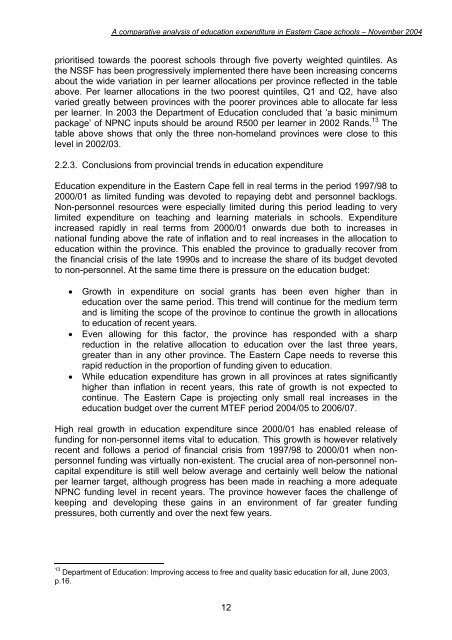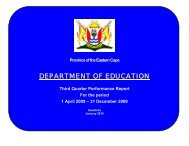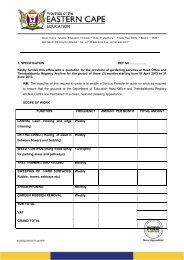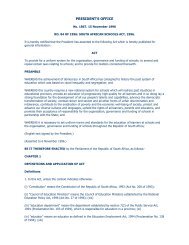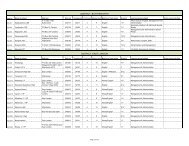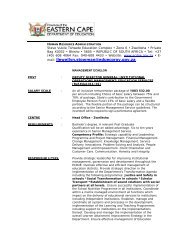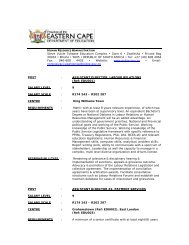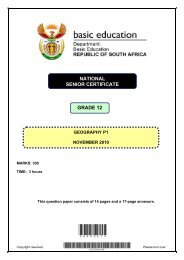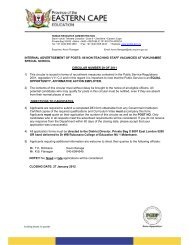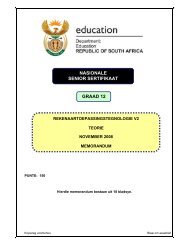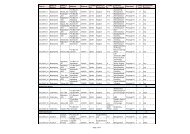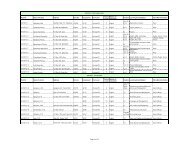School Community Integration Pilot Project - Department of Education
School Community Integration Pilot Project - Department of Education
School Community Integration Pilot Project - Department of Education
Create successful ePaper yourself
Turn your PDF publications into a flip-book with our unique Google optimized e-Paper software.
A comparative analysis <strong>of</strong> education expenditure in Eastern Cape schools – November 2004<br />
prioritised towards the poorest schools through five poverty weighted quintiles. As<br />
the NSSF has been progressively implemented there have been increasing concerns<br />
about the wide variation in per learner allocations per province reflected in the table<br />
above. Per learner allocations in the two poorest quintiles, Q1 and Q2, have also<br />
varied greatly between provinces with the poorer provinces able to allocate far less<br />
per learner. In 2003 the <strong>Department</strong> <strong>of</strong> <strong>Education</strong> concluded that ‘a basic minimum<br />
package’ <strong>of</strong> NPNC inputs should be around R500 per learner in 2002 Rands. 13 The<br />
table above shows that only the three non-homeland provinces were close to this<br />
level in 2002/03.<br />
2.2.3. Conclusions from provincial trends in education expenditure<br />
<strong>Education</strong> expenditure in the Eastern Cape fell in real terms in the period 1997/98 to<br />
2000/01 as limited funding was devoted to repaying debt and personnel backlogs.<br />
Non-personnel resources were especially limited during this period leading to very<br />
limited expenditure on teaching and learning materials in schools. Expenditure<br />
increased rapidly in real terms from 2000/01 onwards due both to increases in<br />
national funding above the rate <strong>of</strong> inflation and to real increases in the allocation to<br />
education within the province. This enabled the province to gradually recover from<br />
the financial crisis <strong>of</strong> the late 1990s and to increase the share <strong>of</strong> its budget devoted<br />
to non-personnel. At the same time there is pressure on the education budget:<br />
• Growth in expenditure on social grants has been even higher than in<br />
education over the same period. This trend will continue for the medium term<br />
and is limiting the scope <strong>of</strong> the province to continue the growth in allocations<br />
to education <strong>of</strong> recent years.<br />
• Even allowing for this factor, the province has responded with a sharp<br />
reduction in the relative allocation to education over the last three years,<br />
greater than in any other province. The Eastern Cape needs to reverse this<br />
rapid reduction in the proportion <strong>of</strong> funding given to education.<br />
• While education expenditure has grown in all provinces at rates significantly<br />
higher than inflation in recent years, this rate <strong>of</strong> growth is not expected to<br />
continue. The Eastern Cape is projecting only small real increases in the<br />
education budget over the current MTEF period 2004/05 to 2006/07.<br />
High real growth in education expenditure since 2000/01 has enabled release <strong>of</strong><br />
funding for non-personnel items vital to education. This growth is however relatively<br />
recent and follows a period <strong>of</strong> financial crisis from 1997/98 to 2000/01 when nonpersonnel<br />
funding was virtually non-existent. The crucial area <strong>of</strong> non-personnel noncapital<br />
expenditure is still well below average and certainly well below the national<br />
per learner target, although progress has been made in reaching a more adequate<br />
NPNC funding level in recent years. The province however faces the challenge <strong>of</strong><br />
keeping and developing these gains in an environment <strong>of</strong> far greater funding<br />
pressures, both currently and over the next few years.<br />
13 <strong>Department</strong> <strong>of</strong> <strong>Education</strong>: Improving access to free and quality basic education for all, June 2003,<br />
p.16.<br />
12


